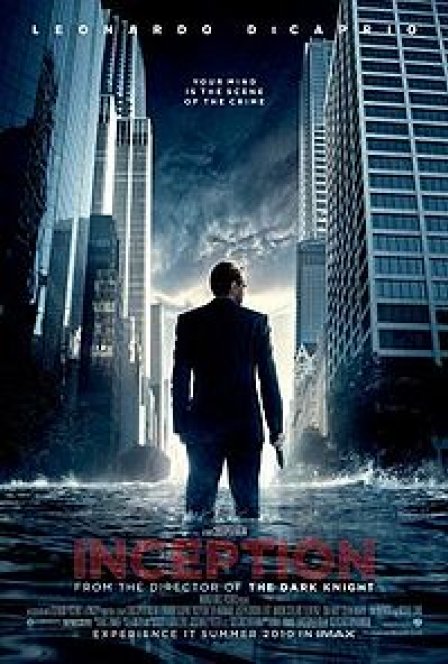Since seeing Christopher Nolan’s Inception more than two weeks ago, I have cycled through a series of feelings from glossy-eyed amazement, to utter contempt, to cool irony, and finally to plain disappointment. The latter is perhaps the most judicial of all emotions one could possibly feel about both a film like Inception and its director Christopher Nolan. Coming from an innovative background in the early years of this past decade and building steadily toward envelope-pushing studio productions, Nolan makes films that are enjoyable and thought-provoking, due to their characteristic combination of confident spectacle and earnest intelligence. They are introverted and textually interact almost exclusively with themselves, while also capable of being read widely. But unexpectedly, it is pretense and a cocksure attitude about the ideological content of big-budget blockbusters that causes Inception to feel disingenuous and insecure. Those same characteristics are also utilized to dismiss contemporary Hollywood cinema as vapid and insincere. Ironically, this attitude is the reason Inception has risen to levels of extreme, undeserved recognition amongst viewers and critics.
Inception represents the zeitgeist of popular American cinema. So saturated by dainty romantic comedies, predictable slasher reboots, and disingenuous, market-driven sequels, even a humble version of Inception’s high-concept psychological thriller could have attracted a wealth of attention. But modesty is not the strong suit of summer blockbusters. Inception is no exception, with immodesty becoming the genesis of innumerable gestures that cause the film to be both absurdly entertaining and gratingly insufferable. The film overcompensates at every step, best exemplified by the relentlessly brooding score that dramatizes even the most stale bites of dialog, as if to suggest that every minuscule detail is of the utmost importance. Bloated and self-congratulatory, Inception eventually becomes unwieldy and ends as an absolute mess. While Nolan’s previous film, The Dark Knight, was also something of a mess, it was at least a mostly endearing one. That film opted for noir polemics over, say, the dialectics of the Western world or as the Joker said best, “an unstoppable force colliding with an immovable object.” The effect was undeniably disabling. While not everyone appreciated the decision, Nolan took a big risk that delivered in the form of one of the most talked-about films of 2008.
With Inception, Nolan largely abandons his history of challenging polemics in favor of a manipulative cinema of distraction. After an expository opening half burdened by malnourished jargon and an obligatory chase sequence, the film succumbs to trope after action film trope, dismembering and condensing three genre films into one. The back half of the film is a four-tiered reverse-heist, complete with kidnapping, car chase, Matrix-esque zero gravity fight scenes, and vintage 007 extreme sport killing sprees. Unsurprisingly, this initially thrilling setpiece so lacks self-restraint that it eventually becomes inane. Nolan gets so caught up in his action film purism and the complexity of his interrelated mechanisms that his screenplay falls into film limbo, drama and action toiling around without purpose. I suppose one could sardonically praise Nolan for designing a film that adheres to self-made dream logic.
What Nolan should not be praised for, however, is designing a consistent or meaningful film. While the film’s action is occasionally engaging, the actors who take part in it are almost entirely vacant. Nolan’s characters lack any kind of depth. Even Dominic Cobb (Leonardo DiCaprio), who receives most of the screenplay’s enervated emotional energy, is an archetype of plain proportions. Joseph Gordon-Levitt’s Arthur is a snoozy stiff, while the capacity of Ellen Page’s Ariadne to perceive the very obvious signs of Cobb’s psychological damage seems to indicate that, on some level, Nolan realizes that his characters are flimsy and uninteresting. This is all pretty predictable fare from Nolan. He seems to relish using actors who can’t fulfill the basic needs of their characters. With the exception of Marion Cotillard as the underdeveloped but still deeply disturbing vision of Cobb’s deceased wife Mal, the rest of the characters are more Bruce Wayne and Rachel Dawes than Joker or Leonard Shelby. Noteworthy is Wally Pfister’s cinematography, which is even better than it was in The Dark Knight. Here he gives action sequences room to breathe and deftly captures Inception’s surrealist universe. Its just too bad Nolan’s subconscious didn’t populate this cinematic dream world with less clunky projections.
Pauline Kael once said of Stanley Kubrick’s 2001: A Space Odyssey (both the film and its director have likely been of some great influence on Christopher Nolan), “If big film directors are to get credit for doing badly what others have been doing brilliantly for years with no money, just because they’ve put it on a big screen, then businessmen are greater than poets and theft is art.” Though ripe for commentary and conversation, Inception is a deeply flawed film. Shooting to be mind blowingly great, it ends up just okay. Not nearly as audacious as folks have made it out to be, Inception is the kind of self-important art that preys on the insecurities of its patrons. I suppose we shouldn’t be surprised, as Nolan takes his film’s psychological premise to its most literal extreme, doing to his audience exactly what Cobb and his gang do to poor Robert Fischer: implant a simple idea in the most elaborate and lavish way possible. Nolan’s simple idea? That Inception is a film worth getting excited over and believing in. That idea has taken hold amongst many, but it remains, just as in the film, an immoral coercion of our emotions and ego.

